Click on images to enlarge
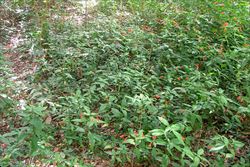
large infestation in rainforest understorey (Photo: Sheldon Navie)
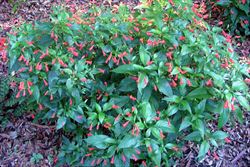
habit (Photo: Sheldon Navie)
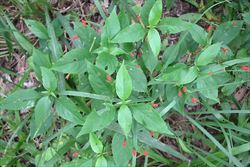
habit (Photo: Sheldon Navie)

root system and older stems (Photo: Sheldon Navie)
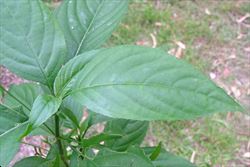
leaves (Photo: Sheldon Navie)

flower buds (Photo: Sheldon Navie)
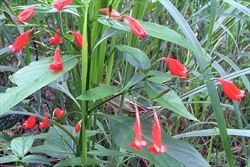
tubular red flowers (Photo: Sheldon Navie)
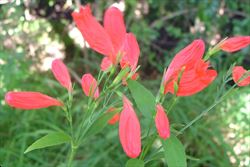
close-up of flowers (Photo: Sheldon Navie)
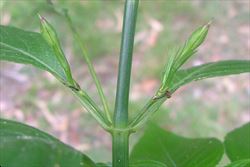
close-up of a younger four-angled stem with young fruit in the leaf forks (Photo: Sheldon Navie)
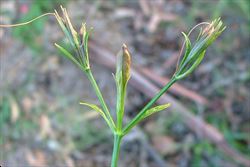
immature fruit (Photo: Sheldon Navie)
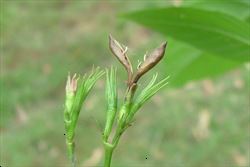
mature fruit that has already released its seeds (Photo: Sheldon Navie)
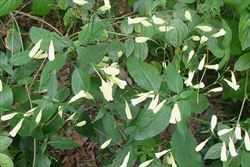
Stephanophysum longifolium 'Alba' (Photo: Sheldon Navie)
Scientific Name
Stephanophysum longifolium Pohl
Synonyms
Ruellia brevifolia (Pohl) C. EzcurraRuellia graecizans Backer
Family
Acanthaceae
Common Names
common wild petunia, red Christmas pride, stephanophysum, tropical wild petunia
Origin
Native to South America (i.e. Brazil, Bolivia, Peru, Argentina and Paraguay).
Naturalised Distribution
Naturalised in some parts of eastern Australia (i.e. in south-eastern and northern Queensland and in the coastal districts of northern New South Wales).
Also naturalised in Fiji and Hawaii, in the Pacific Ocean, and on La Réunion and Mauritius, in the Indian Ocean.
Notes
Tropical wild petunia (Stephanophysum longifolium) is regarded as a minor environmental weed or "sleeper weed" in Queensland and New South Wales. This species has been widely cultivated as a garden ornamental, and was first recorded as becoming naturalised near Nambour in south-eastern Queensland in 1973.
Tropical wild petunia (Stephanophysum longifolium) invades disturbed areas of rainforests and riparian vegetation. For example, it has recently invaded disturbed rainforest vegetation along the lower Mulgrave River in coastal northern Queensland. For this reason it is listed as an "undesirable plant" in the Wet Tropics World Heritage Area. It is also becoming common in riparian vegetation in Brisbane, in south-eastern Queensland, and is reported to be the dominant understorey plant in shaded areas in the grounds of the Bellingen Hospital grounds, in north-eastern New South Wales.
In Fiji, tropical wild petunia (Stephanophysum longifolium) is sometimes locally frequent as a weed on hillsides, along trails and roadsides, and in coconut plantations. In La Réunion it is estimated to have invaded approximately 3000 hectares of wet forest vegetation.

